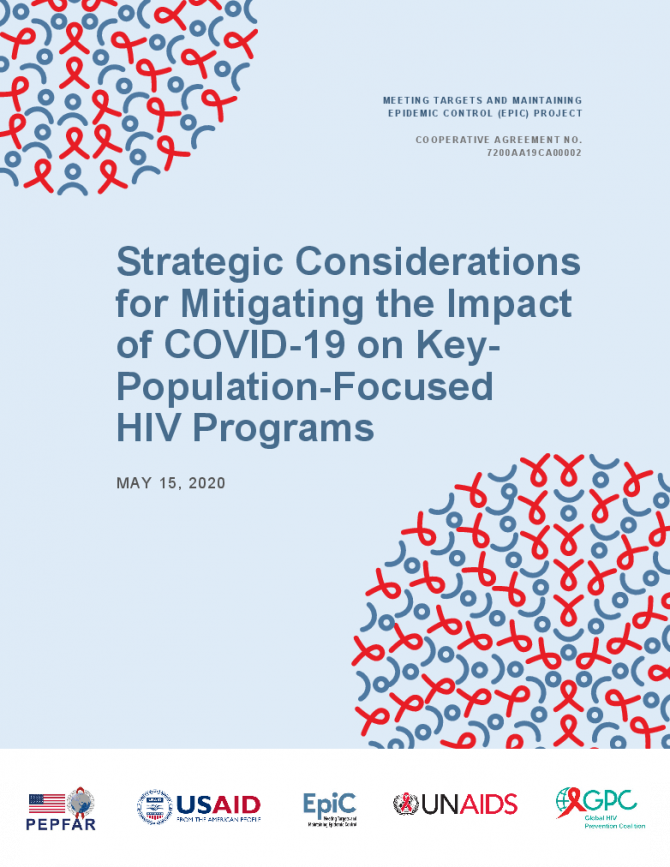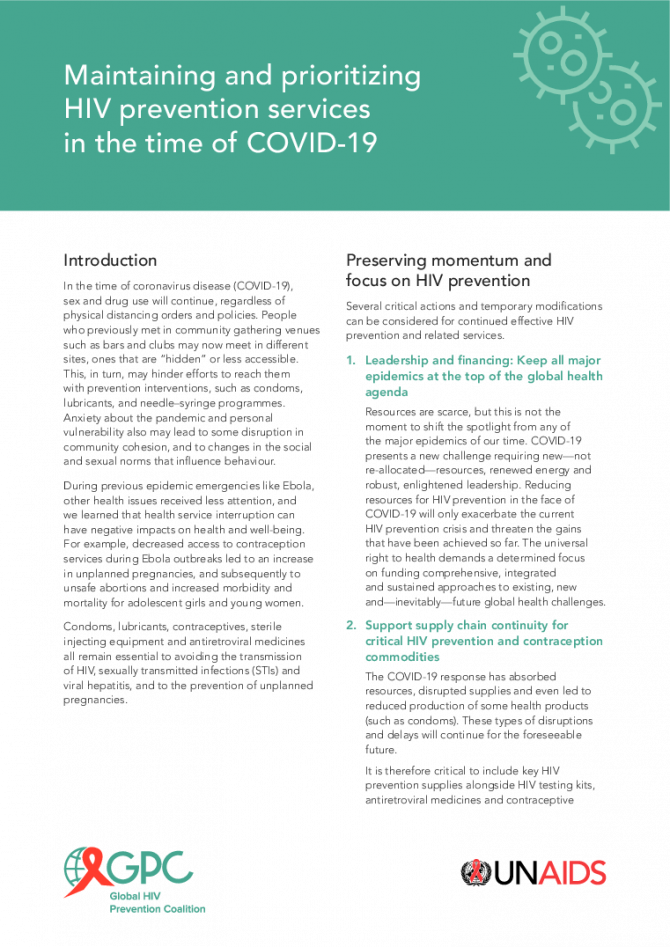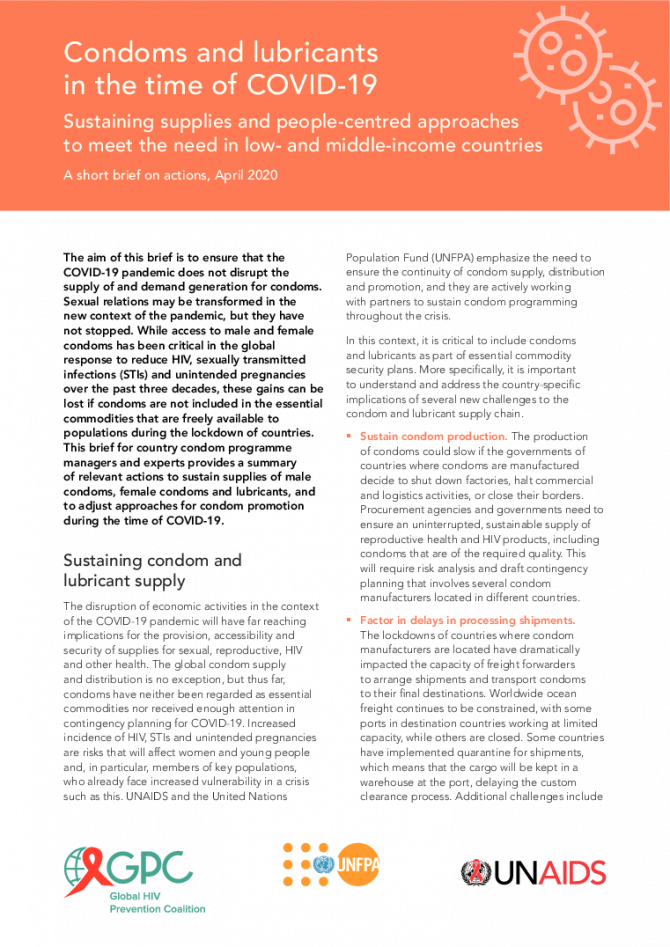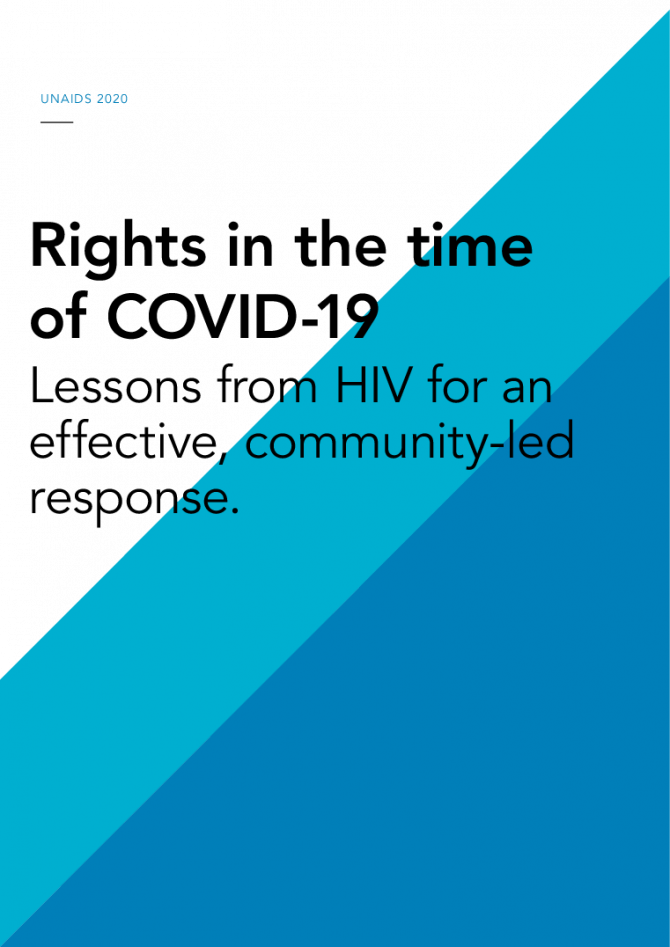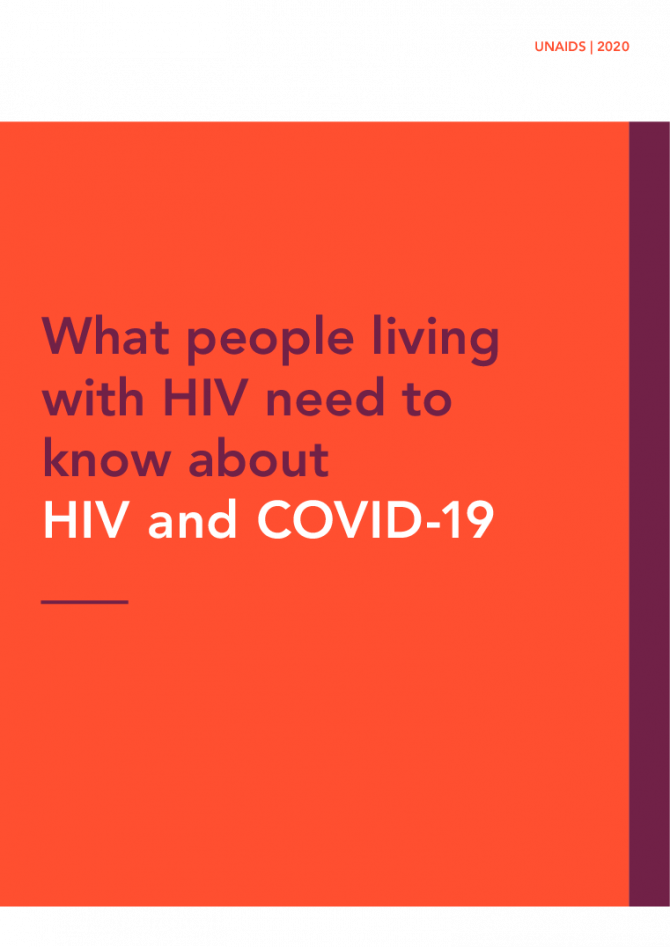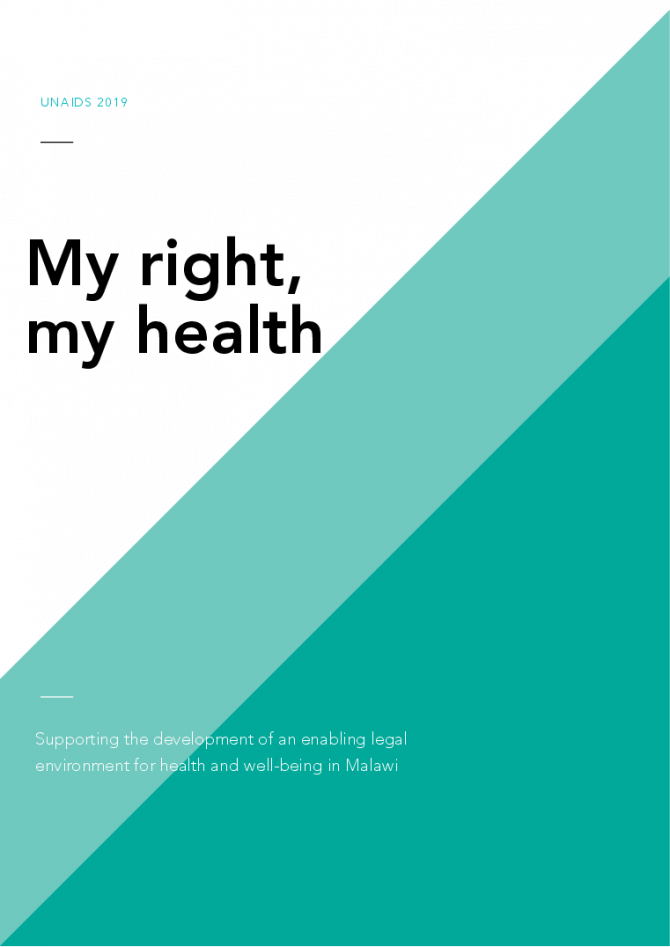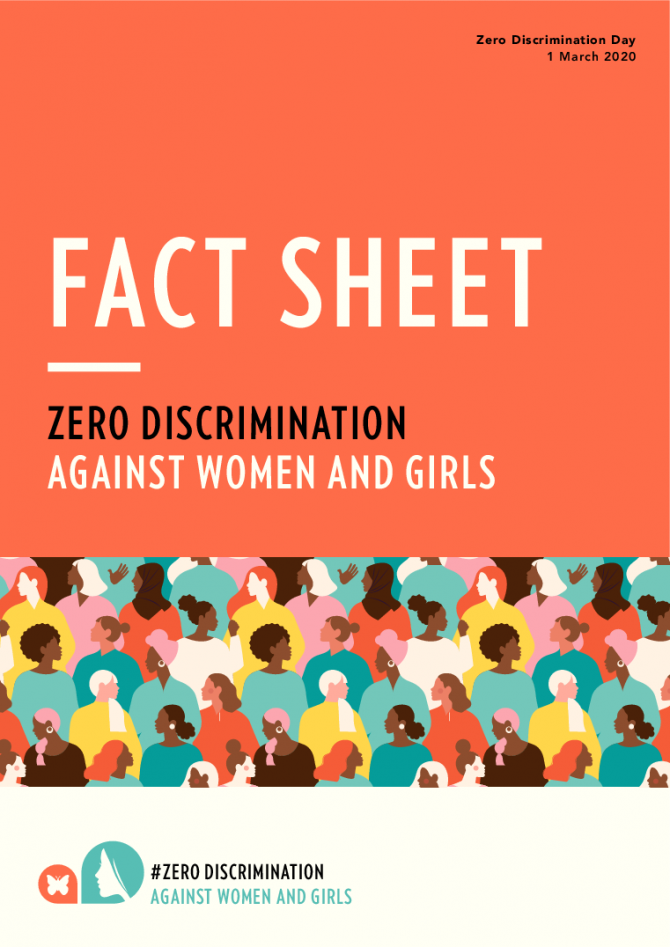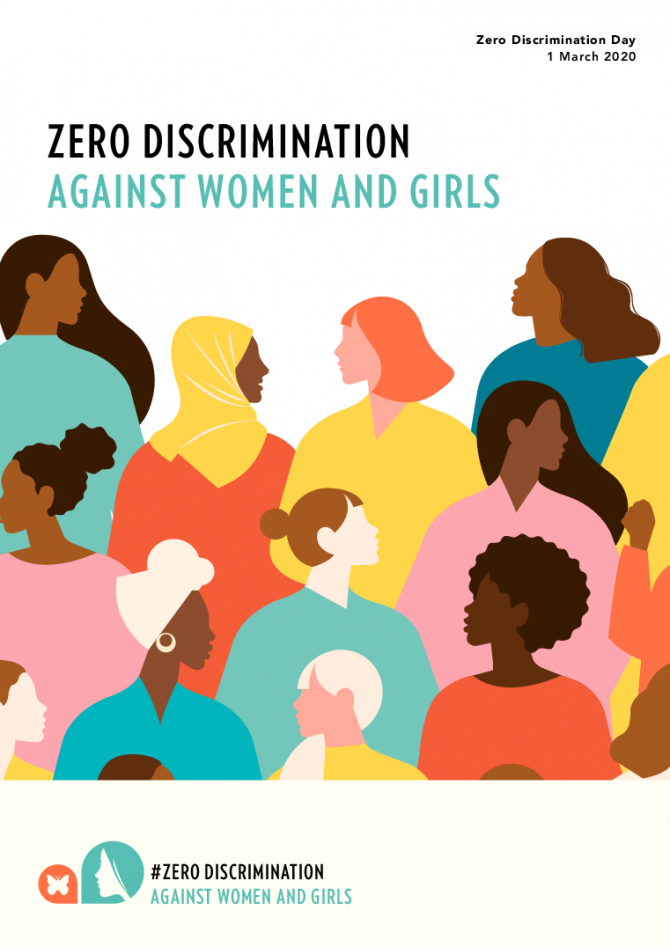Documents
Strategic considerations for mitigating the impact of COVID-19 on key-population-focused HIV programs
04 June 2020
This strategy is intended to support KP-focused HIV programs mitigate the impact of COVID-19. Developed for KP-focused HIV programs implemented or supported by FHI 360 in the Caribbean, Asia, and Africa, it may be used and adapted more broadly. Mitigation strategies refer to efforts to reduce exposure to and impact of COVID-19 on HIV program beneficiaries and staff and safely maintain HIV services within KP-focused HIV programs. Not included herein are strategies for responding to COVID-19 directly. This is a living document that will be updated frequently to reflect the rapidly changing context of COVID-19 and its impact on KP members, staff, and programs.
Documents
Maintaining and prioritizing HIV prevention services in the time of COVID-19
06 May 2020
In the time of coronavirus disease (COVID-19), sex and drug use will continue, regardless of physical distancing orders and policies. People who previously met in community gathering venues such as bars and clubs may now meet in different sites, ones that are “hidden” or less accessible. This, in turn, may hinder efforts to reach them with prevention interventions, such as condoms, lubricants, and needle–syringe programmes. With the widespread loss of livelihood and fewer employment opportunities, transactional sex, sex work and sexual exploitation may increase. Anxiety about the pandemic and personal vulnerability also may lead to some disruption in community cohesion, and to changes in the social and sexual norms that influence behaviour.
Documents
Condoms and lubricants in the time of COVID-19 — Sustaining supplies and people-centred approaches to meet the need in low- and middle-income countries — A short brief on actions, April 2020
06 May 2020
The aim of this brief is to ensure that the COVID-19 pandemic does not disrupt the supply of and demand generation for condoms. Sexual relations may be transformed in the new context of the pandemic, but they have not stopped. While access to male and female condoms has been critical in the global response to reduce HIV, sexually transmitted infections (STIs) and unintended pregnancies over the past three decades, these gains can be lost if condoms are not included in the essential commodities that are freely available to populations during the lockdown of countries. This brief for country condom programme managers and experts provides a summary of relevant actions to sustain supplies of male condoms, female condoms and lubricants, and to adjust approaches for condom promotion during the time of COVID-19.
Documents
Lessons from HIV prevention for preventing COVID-19 in low- and middle-income countries
06 May 2020
The COVID-19 pandemic is rapidly spreading across the world and including countries affected by other infectious disease epidemics, such as HIV, tuberculosis (TB) and malaria. Over the past three decades, the global HIV response has gained experience in developing effective prevention approaches. This brief seeks to provide a summary for decision makers and health programme implementers in low- and middle-income countries (LMICs) to help them make the best possible choices in preventing the virus responsible for COVID-19.
Documents
Rights in the time of COVID-19 — Lessons from HIV for an effective, community-led response
20 March 2020
Right now, we are facing an unpredictable and highly dynamic situation as a global community. However, as we have seen from the solidarity, support and power of communities in the HIV epidemic and already in communities responding to the COVID-19 pandemic, the response must not be fear and stigma. We need to build a culture of solidarity, trust and kindness. Our response to COVID-19 must be grounded in the realities of people’s lives and focused on eliminating the barriers people face in being able to protect themselves and their communities. Empowerment and guidance, rather than restrictions, can ensure that people can act without fear of losing their livelihood, sufficient food being on the table and the respect of their community. Ultimately it will give us a more effective, humane and sustainable response to the epidemic. This document is also available in Arabic.
Documents
What people living with HIV need to know about HIV and COVID-19
01 June 2021
English edition updated June 2021. Data are emerging on the clinical outcomes of COVID-19 among people living with HIV. People living with HIV appear to be at an increased risk of more severe outcomes from COVID-19 compared with other people. People living with HIV should be vaccinated against COVID-19, regardless of their CD4 or viral load, because the potential benefits outweigh the potential risks. People living with HIV should be included in the category of high-risk medical conditions when developing vaccine priority. Importantly, when administering vaccines to people living with HIV, confidentiality about their underlying condition should be preserved.
Documents
My right, my health — Supporting the development of an enabling legal environment for health and well-being in Malawi
04 November 2019
The just rule of law is a critical social determinant of people’s health and well-being. The period from 2008 to 2018 saw fundamental shifts in the legal environment in Malawi for people living with, at risk of and affected by HIV. This case study examines the factors leading to change in Malawi, including the critical role played by civil society organizations, the inspiring advocacy of women living with HIV, the strategic dialogues among communities, parliamentarians and government representatives, and the technical assistance and high-level advocacy with the support of the UNAIDS Joint Programme. Read other documents in the UNAIDS in Focus series
Documents
We’ve got the power — Women, adolescent girls and the HIV response
05 March 2020
This publication marks the 25th anniversary of the Beijing Declaration and Platform for Action. It is dedicated to the women leaders and allied community mobilizers who have devoted their lives to advancing the human rights and dignity of all people affected by the HIV epidemic, and to opposing social injustice, gender inequality, stigma and discrimination, and violence.
Documents
Fact sheet — Zero discrimination against women and girls
27 February 2020
On Zero Discrimination Day and as part of the global movement for equality for women and girls, UNAIDS is highlighting seven areas where discrimination against women and girls persists, raising awareness and calling for change.
Documents
Zero discrimination against women and girls
25 February 2020
On Zero Discrimination Day this year, UNAIDS is challenging the discrimination faced by women and girls in all their diversity in order to raise awareness and mobilize action to promote equality and empowerment for women and girls.

